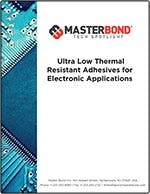Manufacturers of advanced electronic systems will find that advances in adhesives offer the ability to meet nearly any combination of requirements for thermal, environmental, and structural stability. As product manufacturers face greater challenges in assembling die, package, and other components into products able to cope with increasing heat loads, epoxies and silicones are uniquely qualified to meet these increasingly diverse requirements. Learn why ultra low thermally conductive adhesives are the preferred fastening approach in applications requiring careful thermal management.

Sponsored Recommendations
Sponsored Recommendations
Near- and Far-Field Measurements
April 16, 2024
Connectivity – The Backbone of Sustainable Automation
April 16, 2024

